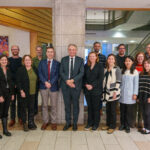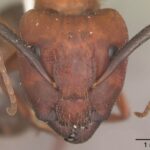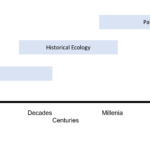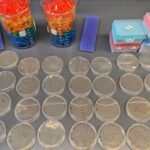evolutionary studies initiative
Rediscovering the Lost Plesiosaur (Cast): Restoring Vanderbilt’s Natural History Museum
Aug. 27, 2024—By: Andy Flick, Evolutionary Studies scientific coordinator Embarking on a new research project often brings unexpected discoveries—some intriguing, some novel, but rarely a find of a lifetime. Such a remarkable discovery occurred when university archivist and associate director Kathy Smith stumbled upon a pile of plaster, hidden away for 60 years in a dim, cluttered...
Chancellor Diermeier visits the Evolutionary Studies Initiative
Jan. 24, 2024—By Andy Flick, Evolutionary Studies scientific coordinator On January 17, 2024, the Evolutionary Studies Initiative (ESI) was honored to receive a visit from Chancellor Daniel Diermeier. Chancellor Diermeier’s visit included an introduction to ESI’s mission and the research of select members, an open-ended discussion on investing in the future of evolutionary studies at Vanderbilt, and...
Vanderbilt researcher finds evidence for ant caste systems driven by chemo-sensing responses
Mar. 13, 2023—By Andy Flick, Evolutionary Studies scientific coordinator Stephen Ferguson, first-author of a new paper with his postdoctoral advisor, Laurence Zwiebel, Cornelius Vanderbilt Chair in Biological Sciences, and two undergraduates associated with the lab, Isaac Bakis (alumnus) and Nicholas Edwards, confirmed the existence of a specialized soldier caste within an ant species in a paper titled,...
Vanderbilt researchers bring paleoecology into the 21st century
Jul. 7, 2022—By Andy Flick, Evolutionary Studies scientific coordinator Science is an inherently collaborative endeavor. When a respected colleague courteously disagrees with your point of view, it can lead to great new papers, perspectives and collaborations. In that same vein, feedback from editors and reviewers of academic journals is an often-understated driver of new research directions. Assistant...
“The Hunger Games: E. coli edition” demonstrates how mutualism and cooperative behavior shape species
May. 20, 2022—Andy Flick, Evolutionary Studies Initiative scientific coordinator Bacteria, not unlike humans, can take up more resources than necessary. When this happens, synthesized byproducts can leak into the environment. This allows the nearby bacteria to evolve cooperative behaviors, such as using the byproducts as nutrients. Cooperation in bacterial communities has also been previously observed with behaviors...





